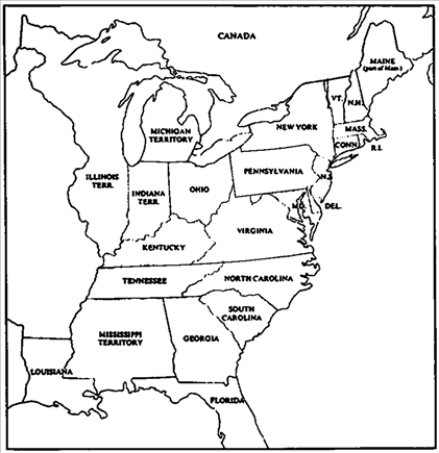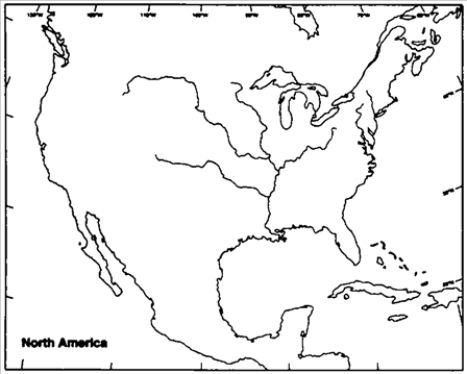Exam 7: Forging a Nation
Exam 1: Three Old Worlds Create a New108 Questions
Exam 2: Europeans Colonize North America108 Questions
Exam 3: North America in the Atlantic World101 Questions
Exam 4: Becoming America112 Questions
Exam 5: The Ends of Empire133 Questions
Exam 6: American Revolutions109 Questions
Exam 7: Forging a Nation161 Questions
Exam 8: Defining the Nation170 Questions
Exam 9: The Rise of the South111 Questions
Exam 10: The Restless North177 Questions
Exam 11: The Contested West100 Questions
Exam 12: Politics and the Fate of the Union178 Questions
Exam 13: Transforming Fire: the Civil War160 Questions
Exam 14: Reconstruction: an Unfinished Revolution122 Questions
Select questions type
Map Exercise 7-2
You will need three pens of different colors for this exercise. On the map that follows:
 -Refer to Map Exercise 7-2.
Part 1
Use a different color pen for each of the three nations holding territory in North America in the period from 1783 to 1794. Indicate your color choice by coloring the labeled boxes in the map legend.
Part 2
Color the area corresponding to the territory held by the United States with the color chosen to represent the United States. Do not color the land surrendered by Native Americans in the Treaty of Greenville, and properly label this territory.
Part 3
Color the area corresponding to the territory held by Spain with the color chosen to represent that nation. Label this area "Spanish."
Part 4
Color the area corresponding to the territory held by Great Britain with the color chosen to represent that nation. Label this area "British."
-Refer to Map Exercise 7-2.
Part 1
Use a different color pen for each of the three nations holding territory in North America in the period from 1783 to 1794. Indicate your color choice by coloring the labeled boxes in the map legend.
Part 2
Color the area corresponding to the territory held by the United States with the color chosen to represent the United States. Do not color the land surrendered by Native Americans in the Treaty of Greenville, and properly label this territory.
Part 3
Color the area corresponding to the territory held by Spain with the color chosen to represent that nation. Label this area "Spanish."
Part 4
Color the area corresponding to the territory held by Great Britain with the color chosen to represent that nation. Label this area "British."
(Essay)
4.8/5  (38)
(38)
Instructions:
∙ Identify each item. Give an explanation or description of the item. Answer the questions who, what, where, and when.
Explain the historical significance of each item. Establish the historical context in which the
∙ item exists. Establish the item as the result of or as the cause of other factors existing in the society under study. Answer this question: What were the political, social, economic,
and/or cultural consequences of this item?
-assumption of state debts
(Essay)
4.9/5  (35)
(35)
Discuss the decisions made by the First Congress in response to three major problems:
a. the addition of a bill of rights to the Constitution
b. setting up and organizing the executive departments
c. organizing the federal judiciary
(Essay)
4.8/5  (46)
(46)
Discuss the domestic political ramifications of the XYZ Affair. Concentrate on the extent to which the reactions of the two political factions to this affair confirmed in the minds of opposition leaders that the other party intended to subvert the republic's ideology.
(Essay)
4.8/5  (41)
(41)
Instructions:
∙ Identify each item. Give an explanation or description of the item. Answer the questions who, what, where, and when.
Explain the historical significance of each item. Establish the historical context in which the
∙ item exists. Establish the item as the result of or as the cause of other factors existing in the society under study. Answer this question: What were the political, social, economic,
and/or cultural consequences of this item?
-Gabriel's Rebellion
(Short Answer)
4.7/5  (30)
(30)
Map Exercise 7-1
You will need four pens of different colors for this exercise. On the outline map that follows:
 -Refer to Map Exercise 7-1. Label each of the following rivers and bodies of water: Atlantic Ocean
Gulf of Mexico Mississippi River St. Lawrence River
-Refer to Map Exercise 7-1. Label each of the following rivers and bodies of water: Atlantic Ocean
Gulf of Mexico Mississippi River St. Lawrence River
(Short Answer)
4.9/5  (39)
(39)
The government's first independent source of revenue under the Articles of Confederation was
(Multiple Choice)
4.9/5  (46)
(46)
The argument over the creation of the Bank of the United States focused on which of the following questions?
(Multiple Choice)
4.9/5  (32)
(32)
Discuss the impact of revolutionary ideology on concepts pertaining to education in the new American republic. How did the educational reform movement of the 1780s and 1790s affect women? What was the particular contribution of Judith Sargent Murray?
(Essay)
4.7/5  (23)
(23)
Instructions:
∙ Identify each item. Give an explanation or description of the item. Answer the questions who, what, where, and when.
Explain the historical significance of each item. Establish the historical context in which the
∙ item exists. Establish the item as the result of or as the cause of other factors existing in the society under study. Answer this question: What were the political, social, economic,
and/or cultural consequences of this item?
-the Alien and Sedition Acts
(Essay)
4.8/5  (37)
(37)
Instructions:
∙ Identify each item. Give an explanation or description of the item. Answer the questions who, what, where, and when.
Explain the historical significance of each item. Establish the historical context in which the
∙ item exists. Establish the item as the result of or as the cause of other factors existing in the society under study. Answer this question: What were the political, social, economic,
and/or cultural consequences of this item?
-economic "Hamiltonian") republicanism
(Essay)
5.0/5  (39)
(39)
Instructions:
∙ Identify each item. Give an explanation or description of the item. Answer the questions who, what, where, and when.
Explain the historical significance of each item. Establish the historical context in which the
∙ item exists. Establish the item as the result of or as the cause of other factors existing in the society under study. Answer this question: What were the political, social, economic,
and/or cultural consequences of this item?
-Life of Washington
(Essay)
4.9/5  (32)
(32)
Painters Gilbert Stuart and Charles Willson Peale are famous for their
(Multiple Choice)
4.7/5  (35)
(35)
How did Republican leaders justify their opposition to Alexander Hamilton and his policies?
(Multiple Choice)
4.8/5  (34)
(34)
Map Exercise 7-2
You will need three pens of different colors for this exercise. On the map that follows:
 -Refer to Map Exercise 7-2. Label the following bodies of water: Green Bay
Lake Erie Lake Huron Lake Michigan Lake Ontario
Mississippi River Ohio River
St. Lawrence River
-Refer to Map Exercise 7-2. Label the following bodies of water: Green Bay
Lake Erie Lake Huron Lake Michigan Lake Ontario
Mississippi River Ohio River
St. Lawrence River
(Short Answer)
4.9/5  (45)
(45)
Which of the following is true of the Treaty of Greenville?
(Multiple Choice)
4.9/5  (34)
(34)
Instructions:
∙ Identify each item. Give an explanation or description of the item. Answer the questions who, what, where, and when.
Explain the historical significance of each item. Establish the historical context in which the
∙ item exists. Establish the item as the result of or as the cause of other factors existing in the society under study. Answer this question: What were the political, social, economic,
and/or cultural consequences of this item?
-the system of a separation of powers
(Essay)
4.7/5  (37)
(37)
Instructions:
∙ Identify each item. Give an explanation or description of the item. Answer the questions who, what, where, and when.
Explain the historical significance of each item. Establish the historical context in which the
∙ item exists. Establish the item as the result of or as the cause of other factors existing in the society under study. Answer this question: What were the political, social, economic,
and/or cultural consequences of this item?
-the New Jersey Plan
(Essay)
4.8/5  (39)
(39)
Instructions:
∙ Identify each item. Give an explanation or description of the item. Answer the questions who, what, where, and when.
Explain the historical significance of each item. Establish the historical context in which the
∙ item exists. Establish the item as the result of or as the cause of other factors existing in the society under study. Answer this question: What were the political, social, economic,
and/or cultural consequences of this item?
-growth of the free black population
(Essay)
4.8/5  (37)
(37)
Instructions:
∙ Identify each item. Give an explanation or description of the item. Answer the questions who, what, where, and when.
Explain the historical significance of each item. Establish the historical context in which the
∙ item exists. Establish the item as the result of or as the cause of other factors existing in the society under study. Answer this question: What were the political, social, economic,
and/or cultural consequences of this item?
-the Virginia Plan
(Essay)
4.9/5  (36)
(36)
Showing 81 - 100 of 161
Filters
- Essay(0)
- Multiple Choice(0)
- Short Answer(0)
- True False(0)
- Matching(0)